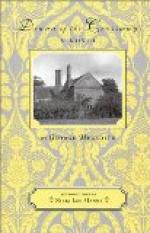sound of that hollow big word. The irreverent
imp of her humour came to her relief by calling forth
the Twelve, in the tone of the clerk of the Court,
and they answered to their names of trades and crafts
after the manner of Titania’s elves, and were
questioned as to their fitness, by education, habits,
enlightenment, to pronounce decisively upon the case
in dispute, the case being plainly stated. They
replied, that the long habit of dealing with scales
enabled them to weigh the value of evidence the most
delicate. Moreover, they were Englishmen, and
anything short of downright bullet facts went to favour
the woman. For thus we light the balance of
legal injustice toward the sex: we conveniently
wink, ma’am. A rough, old-fashioned way
for us! Is it a Breach of Promise?—She
may reckon on her damages: we have daughters
of our own. Is it a suit for Divorce?—Well,
we have wives of our own, and we can lash, or we can
spare; that’s as it may be; but we’ll keep
the couple tied, let ’em hate as they like,
if they can’t furnish pork-butchers’ reasons
for sundering; because the man makes the money in
this country.—My goodness! what a funny
people, sir!—It ’s our way of holding
the balance, ma’am.—But would it
not be better to rectify the law and the social system,
dear sir?—Why, ma’am, we find it
comfortabler to take cases as they come, in the style
of our fathers.—But don’t you see,
my good man, that you are offering scapegoats for
the comfort of the majority?—Well, ma’am,
there always were scapegoats, and always will be;
we find it comes round pretty square in the end.
’And I may be the scapegoat, Emmy! It
is perfectly possible. The grocer, the pork-butcher,
drysalter, stationer, tea-merchant, et caetera —they
sit on me. I have studied the faces of the juries,
and Mr. Braddock tells me of their composition.
And he admits that they do justice roughly—a
rough and tumble country! to quote him—though
he says they are honest in intention.’
‘More shame to the man who drags you before
them—if he persists!’ Emma rejoined.
‘He will. I know him. I would not
have him draw back now,’ said Diana, catching
her breath. ’And, dearest, do not abuse
him; for if you do, you set me imagining guiltiness.
Oh, heaven!—suppose me publicly pardoned!
No, I have kinder feelings when we stand opposed.
It is odd, and rather frets my conscience, to think
of the little resentment I feel. Hardly any!
He has not cause to like his wife. I can own
it, and I am sorry for him, heartily. No two
have ever come together so naturally antagonistic
as we two. We walked a dozen steps in stupefied
union, and hit upon crossways. From that moment
it was tug and tug; he me, I him. By resisting,
I made him a tyrant; and he, by insisting, made me
a rebel. And he was the maddest of tyrants—a
weak one. My dear, he was also a double-dealer.
Or no, perhaps not in design. He was moved at
one time by his interests; at another by his idea
of his honour. He took what I could get for
him, and then turned and drubbed me for getting it.’




